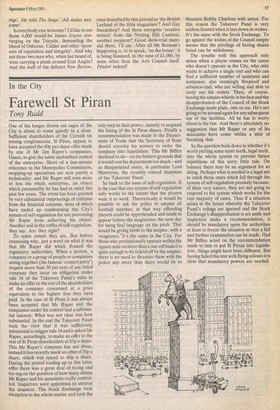In the City
Farewell St Piran
Tony Rudd
One of the longer drawn out sagas of the City is about to come quietly to a close. Sufficient shareholders of the Cornish tin mining conglomerate, St Piran, appear to have accepted the 60p per share offer made by one of Mr Jim Raper's companies, Gasco, to give the latter undoubted control of the enterprise. Short of a last-minute reference to the Monopolies Commission, mopping-up operations are now purely a technicality; and Mr Raper will own more or less the whole enterprise, an object which presumably he has had in mind this past few years. The event has been greeted by very substantial outpourings of criticism from the financial columns, most of which have ended up condemning the City's system of self-regulation for not preventing Mr Raper from achieving his object. Another nail in the coffin of self-regulation, they say. Are they right?
To some extent they are. But before examining why, just a word on what it was that Mr Raper did which flouted the regulatory authorities. When a person, a company or a group of people or companies acting together (the famous 'concert party') acquire more than 30 per cent of any listed company they incur an obligation under rule 34 of the Takeover Panel's rules to make an offer to the rest of the shareholders of the company concerned at a price equivalent to the highest that they have paid. In the case of St Piran it has always been accepted that Mr Raper and the companies under his control had a substantial interest. What was not clear was how substantial. In the end the Takeover Panel took the view that it was sufficiently substantial to trigger rule 34 and it asked Mr Raper, accordingly, to make an offer to the rest of St Piran shareholders at 85p a share. This Mr Raper's company has not done; instead it has recently made an offer of 50p a share, which was raised to 60p a share. During the period leading up to this latter offer there was a great deal of to-ing and fro-ing on the question of how many shares Mr Raper and his associates really controlled. Inspectors were appointed to unravel the situation. The Stock Exchange took exception to the whole matter and took the only step in their power, namely to suspend the listing of the St Piran shares. Finally a recommendation was made to the Department of Trade that the Secretary of State should exercise his powers to order the company into liquidation. This Mr Biffen declined to do — on the bizarre grounds that it would cost his department too much — and so disappointed many, in particular Lord Shawcross, the recently retired chairman of the Takeover Panel.
So back to the issue of self-regulation. It is the case that any system of self-regulation only works to the extent that the players want it to work. Theoretically it would be possible to ask the police to umpire all football matches; in that way offending players could be apprehended and made to appear before the magistrates the next day for using foul language on the pitch. That would be giving teeth to the umpire, with a vengeance nes the same in the City. For those who professionally operate within the square mile on more than a one-off basis it is quite enough to be ticked off by the umpire; there is no need to threaten them with the police any more than there would be to threaten Bobby Charlton with arrest. For this reason the Takeover Panel is very seldom flouted when it lays down its wishes. It's the same with the Stock Exchange. To go against the wishes of the Council simply means that the privilege of having shares listed can be withdrawn.
The trouble with this approach only arises when a player comes on the scene who doesn't operate in the City, who only wants to achieve a single end and who can find a sufficient number of assistants and nominees, also seemingly fireproof and asbestos-clad, who are willing and able to carry out his orders. Then, of course, having the umpire whistle in his face and the disapprobation of the Council of the Stock Exchange made plain, cuts no ice. He's not going to be around again for any subsequent use of the facilities. All he has to worry about is the law. And there's absolutely no suggestion that Mr Raper or any of his associates have come within a mile of breaking that.
So the question boils down to whether it's worth putting some more teeth, legal teeth, into the whole system to prevent future repetitions of this sorry little tale. On balance there may be an argument for so doing. Perhaps what is needed is a legal net to catch those cases which fall through the system of self-regulation precisely because, of their very nature, they are not going to respond to the system which works for the vast majority of cases. Thus if a situation arises in the future whereby the Takeover Panel's rulings are ignored and the Stock Exchange's disapprobation is set aside and inspectors make a recommendation, it should be mandatory upon the authorities at least to freeze the situation so that a full and further examination can be made. Had Mr Biffen acted on the recommendation made to him to put St Pirran into liquidation, things might have been different. But having failed this test with flying colours it is clear that mandatory powers are needed.










































 Previous page
Previous page